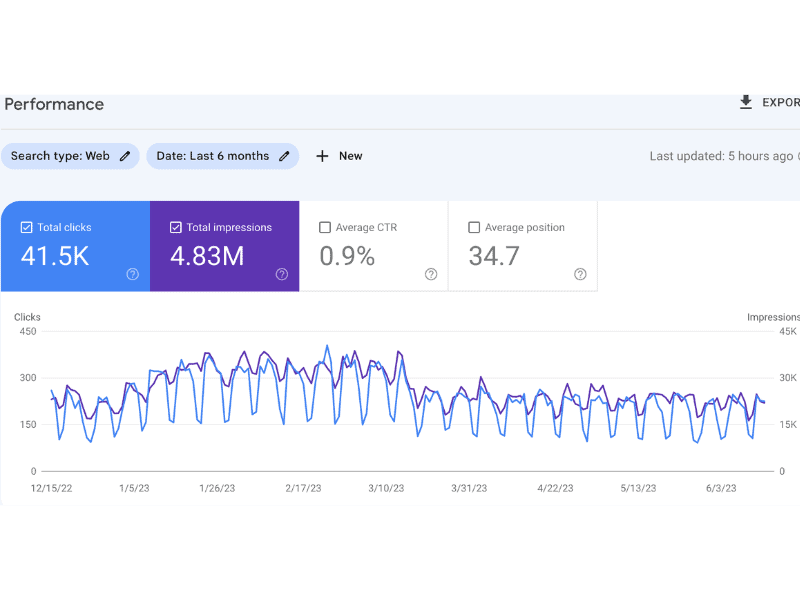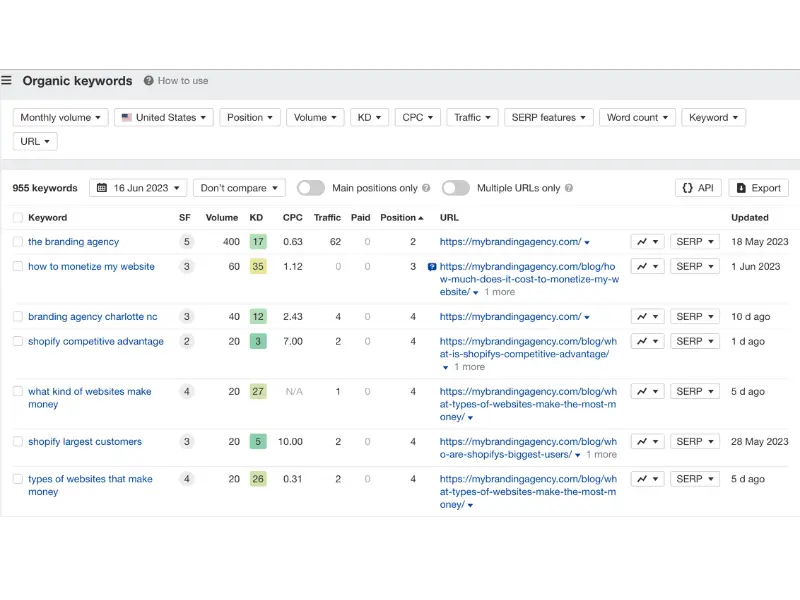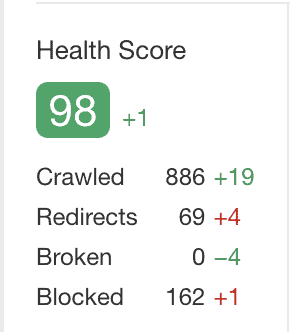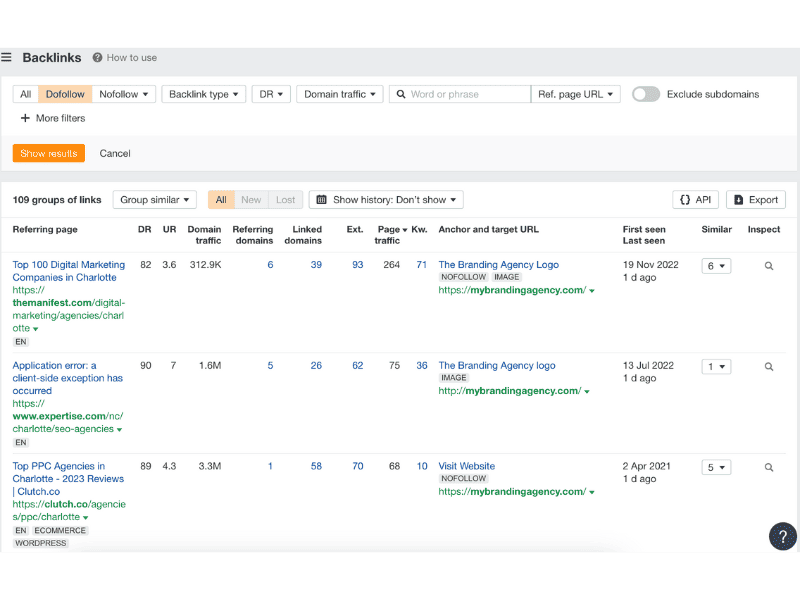In the fast-paced world of digital marketing, SEO rankings play a crucial role in determining the online visibility and success of websites. However, website owners often experience a perplexing phenomenon where their SEO rankings drop on weekends, causing their site’s average position to plummet. This article will explore the factors contributing to SEO ranking drops on the weekend and provide actionable insights to address this issue.
Why Do Our SEO Rankings Drop on the Weekend?
Weekends are often characterized by a drop in SEO rankings for many websites, leading to decreased organic search traffic and visibility. Understanding the reasons behind this phenomenon can help you develop strategies to mitigate the negative impact and maintain consistent performance in search engine rankings.
1. Search Engine Algorithm Updates:
Search engines like Google regularly update their algorithms to improve search results and user experience. These updates can affect the ranking positions of websites, leading to fluctuations in search rankings. It is common for algorithm updates to occur during the weekend, causing temporary drops in SEO rankings. Staying informed about such updates, especially those announced by Google, can help you understand and adapt to any changes that might impact your website’s ranking.
2. Reduced Search Activity:
Weekends often witness a decrease in search activity compared to weekdays. People tend to engage in different activities during their leisure time, resulting in lower search volume and less competition for keywords. As a consequence, websites may experience a drop in search rankings as search engines prioritize more active and relevant content. However, it’s worth noting that the impact of reduced search activity on rankings may vary depending on the industry, target audience, and other factors.
3. Weekend Updates and Maintenance:
Many websites undergo technical updates, maintenance, or server changes over the weekend. These activities can temporarily affect website performance, load times, and overall user experience. Search engines consider user experience a crucial ranking factor, so if your website is experiencing technical issues or downtime during the weekend, it can impact your SEO rankings negatively.
4. Link Building and Content Updates:
Link building and content updates are vital aspects of SEO. However, these activities are often less active during the weekends, leading to fewer backlinks acquired and new content published. Search engines value fresh and relevant content and authoritative backlinks, so a lack of activity in these areas can contribute to ranking drops on the weekend.
5. Competitor Activity:
While your SEO efforts may reduce during the weekends, your competitors might continue optimizing their websites or publishing new content. If they surpass your website in terms of optimization or relevance during this time, it can potentially lead to ranking drops. Monitoring your competitors’ activities and adjusting your SEO strategies accordingly can help you stay competitive and minimize ranking fluctuations.
Understanding the Impact of Weekend Search Ranking Drops

When comprehending the effects of weekend search ranking drops, it is crucial to delve into the depths of this phenomenon. A meticulous examination of statistical data has shed light on a consistent pattern wherein rankings experience a decline during Saturdays and Sundays compared to weekdays. This dip in rankings can be ascribed to a myriad of factors, including changes in user behavior, search volume fluctuations, and adjustments in search engine algorithms.
To fully explore the implications of weekend search ranking drops, it is essential to consider various aspects related to keywords, rankings, and SEO strategies. By thoroughly examining the dropped rankings and investigating their reasons, web developers, SEO teams, and digital marketers can gain valuable insights into optimizing their websites and content for the weekends.
Analyzing the Keyword Rankings: Unveiling the Weekend Slump
The significance of weekend ranking drops becomes evident when we scrutinize the performance of specific keywords during these periods. SEO professionals can identify distinct patterns of dropping rankings by tracking and comparing keyword rankings between weekdays and weekends. Such detailed analysis helps comprehend the impact of weekends on search rankings and paves the way for developing effective strategies to counter this slump.
Exploring the Dynamic Nature of Search Engine Algorithms
In our quest to decipher the reasons behind weekend ranking drops, it is crucial to acknowledge the influence of search engine algorithms. Search engines like Google continuously refine their algorithms to enhance user experience and deliver more relevant search results. However, these algorithm updates can inadvertently affect rankings, resulting in fluctuations during weekends. Understanding the relationship between search engine algorithm changes and weekend ranking drops empowers website owners and SEO experts to adapt their strategies accordingly.
User Behavior Shifts: Unveiling the Weekend Search Landscape
Weekends witness a shift in user behavior, which can significantly impact search rankings. People often engage in different activities, such as leisure browsing, online shopping, or exploring local events during their time off. This change in user intent and search patterns can lead to variations in search volume, favoring specific types of content and keywords. By recognizing these behavioral shifts and aligning their SEO strategies accordingly, website owners can capitalize on the weekend search landscape and mitigate the impact of ranking drops.
Strategies to Mitigate Weekend Ranking Drops
A comprehensive understanding of the factors contributing to weekend ranking drops allows SEO professionals to devise effective strategies to combat this issue. From optimizing content and keywords for weekend searches to creating targeted campaigns, various tactics can help restore rankings during these periods. Website owners can ensure their rankings remain competitive even on weekends by implementing proactive measures and constantly monitoring performance metrics.
✳️ Unraveling the mystery behind weekend search ranking drops involves a deep dive into the various factors. By acknowledging the significance of keywords, search engine algorithms, and user behavior shifts, we can develop informed strategies to tackle this phenomenon. With careful analysis and diligent optimization efforts, website owners and digital marketers can navigate the weekend search landscape and maintain competitive weekly rankings, maximizing their online visibility and driving site traffic.
Analyzing the Reasons Behind Keyword Dropped Rankings

To find the root cause of keyword-dropped rankings, it is essential to conduct a comprehensive analysis. Factors such as increased competition, fluctuations in search volume, seasonal trends, and algorithm updates can all contribute to these drops. By closely monitoring keyword performance and keeping a pulse on industry trends, website owners can identify the keywords and pages affected by ranking drops.
In search engine optimization (SEO), understanding why your website’s keywords experience a drop in rankings is crucial. By delving into a comprehensive analysis, you can unearth the underlying causes behind this phenomenon. Numerous factors come into play, including intensified competition, fluctuations in search volume, seasonal trends, and algorithm updates. Staying vigilant and keeping a finger on the pulse of industry trends allow website owners to discern the keywords and pages that bear the brunt of ranking drops.
When investigating the reasons behind ranking drops, it’s essential to consider various aspects. Weekends, for example, often witness changes in search behavior, which can affect keyword rankings. Moreover, Sundays exhibit distinct patterns in search queries, potentially impacting your website’s visibility. Stay informed about updates from search engine journals and marketing experts, as these insights can shed light on SEO’s technical and strategic aspects. Additionally, changes in the development of web technologies, such as those discussed by the SEJ team on Wednesday, June, are worth considering to grasp the bigger picture.
One crucial aspect of your analysis is to examine the effects of Google updates. The search giant frequently introduces algorithm modifications that can influence your website’s rank. Keeping track of these updates and their subsequent impact on your site’s performance allows you to respond promptly and mitigate any adverse effects. It’s also essential to assess the overall health of your website, scrutinizing its pages, links, and content for any areas that might need improvement. Optimizing your keywords, building quality backlinks, and crafting engaging and informative content contribute to a robust SEO strategy.
To navigate the complexities of SEO, it’s vital to address pertinent questions that arise during your analysis. For instance, are there any noticeable shifts in search rankings across different search engines? Is ranking drops more prevalent in a specific time frame or particular month? By examining these inquiries, you gain a deeper understanding of the nuances of keyword rankings and can tailor your strategies accordingly.
As you delve further into the analysis, consider leveraging various tools and resources available to SEO practitioners. Platforms like Moz offer valuable insights into keyword performance, competitor analysis, and website traffic. Furthermore, staying up to date with the latest industry news and trends allows you to remain adaptive and responsive to changes in search engine algorithms and ranking dynamics. In addition, techniques like disavowing low-quality backlinks and optimizing your site’s structure and user experience can positively impact your rankings.
Ultimately, the process of analyzing keyword dropped rankings is an ongoing one, requiring constant vigilance and a proactive approach. By employing strategic SEO practices, monitoring industry developments, and regularly assessing your website’s performance, you can identify the root causes behind ranking drops and take appropriate action to restore and improve your search rankings.
How to React When Your Site’s SEO Rankings Are Dropping

Experiencing a decline in SEO rankings can be pretty discouraging, but it presents an opportunity for strategic action. Take a proactive approach by thoroughly auditing your website’s technical elements, including site speed, mobile responsiveness, and crawlability. Moreover, evaluate your content strategy to ensure it aligns with the current search intent, optimizing your chances of a favorable ranking. Engage in practical link-building activities to enhance your website’s authority, and consider exploring the option of disavowing toxic backlinks. By implementing these proactive measures, you can effectively mitigate the impact of ranking drops and work diligently towards reclaiming lost positions.
To better navigate this situation, it’s essential to understand the potential causes behind the drop in rankings. One common factor to consider is the effect of weekend searches. Statistical analyses have indicated that search rankings often fluctuate during weekends, particularly Sundays. According to a study conducted by Engine Journal, a noticeable drop in search engine rankings during weekends leads to a decline in organic traffic. Therefore, weekend fluctuations might be a contributing factor to your current situation.
Another aspect to consider is the occurrence of recent Google updates. Keeping track of these algorithm changes can provide insights into potential reasons for the drop in rankings. For instance, the SEO community has observed that Google released a major update in early March, affecting search rankings for numerous websites. By staying updated on such developments, you can better understand how algorithmic shifts may impact your site’s performance.
When faced with a drop in rankings, evaluating your website’s content and keywords is essential. Conduct a thorough analysis of your keyword and search rankings to identify areas that have experienced significant drops. This assessment will help you pinpoint the pages and keywords that require attention and improvement. By addressing these specific issues, you can work towards restoring your site’s visibility and attracting relevant traffic.
Additionally, consider contacting industry experts or joining online communities to discuss your situation and seek advice. Engaging with SEO and digital marketing professionals can provide valuable insights and potential solutions. Websites like Moz and Search Engine Journal (SEJ) offer informative articles and forums where you can find answers to your questions. Leveraging these communities’ collective knowledge and experience can significantly aid you in your quest to regain lost rankings.
Furthermore, take a moment to assess your backlink profile. Links play a crucial role in SEO; toxic backlinks can harm your website’s authority and rankings. If you suspect that low-quality or spammy backlinks are contributing to the drop in rankings, consider using the disavow tool provided by Google. This tool lets you communicate to Google that you want to avoid specific backlinks being considered when evaluating your site’s ranking. However, exercise caution and thoroughly review each backlink before deciding, as disavowing legitimate links can also have adverse effects.
✳️ Experiencing a drop in SEO rankings is undoubtedly challenging, but it presents an opportunity to reassess and refine your website’s optimization strategy. By conducting a comprehensive analysis of technical elements, content strategy, and backlink profile, you can identify areas for improvement and implement necessary measures to regain lost positions. Stay informed about Google updates and industry news, seek advice from reputable sources, and remain persistent. With a well-thought-out approach, you can navigate the fluctuations of search rankings and continue to drive valuable traffic to your website.
Exploring the Relationship Between Site Pages and Ranking Drops
In some cases, certain pages on a website may experience more significant ranking drops than others. This discrepancy can be attributed to various factors, including changes in content quality, relevance, and user engagement metrics. Analyzing page-specific data and making targeted improvements can help mitigate the negative impact of ranking drops on specific pages and contribute to overall SEO performance.
One of the primary factors contributing to ranking drops is the quality of content. Search engines constantly strive to provide users with the most relevant and valuable content, meaning any changes in the quality or relevance of a page’s content can significantly impact its ranking position. If a page’s content becomes outdated, irrelevant, or fails to meet the users’ expectations, it may experience a drop in rankings.
User engagement metrics are also crucial in determining a page’s ranking. Metrics such as bounce rate, time on page, and click-through rate provide search engines valuable insights into how users interact with a particular page. If these metrics indicate that users are not finding the content engaging or are quickly leaving the page, search engines may interpret it as a signal that the page is not meeting user needs, leading to a decline in rankings.
In addition to content quality and user engagement metrics, external factors can influence ranking drops. Furthermore, changes in the competitive landscape, such as new competitors entering the market or existing competitors improving their SEO strategies, can also result in ranking drops for specific pages.
It is crucial to analyze page-specific data and make targeted improvements to mitigate the negative impact of ranking drops on specific pages. Start by identifying the pages that have experienced significant declines in rankings and assess their content quality, relevance, and user engagement metrics. Conduct a thorough keyword analysis to ensure that the pages are optimized for the right keywords and align with users’ search intent.
In addition to optimizing the content, pay attention to the technical aspects of your website. Issues such as slow page load times, broken links, or poor mobile optimization can negatively impact a page’s rankings and should be addressed promptly.
Consider seeking expert advice from SEO professionals or your in-house SEO team to discuss strategies for recovering from ranking drops. They can help you identify potential issues, implement necessary changes, and monitor the impact of those changes on your search rankings.
Understanding the relationship between site pages and ranking drops is essential for maintaining a strong SEO performance. By analyzing page-specific data, making targeted improvements, and staying proactive in your SEO strategy, you can mitigate the negative impact of ranking drops on specific pages and contribute to your website’s overall SEO success.
The Link Building Connection: Investigating Ranking Drops

Link building, an integral part of SEO, determines search rankings. A sudden drop in rankings can often be attributed to a decrease in the number or quality of backlinks. It is imperative to conduct regular link profile audits to identify potential issues that may be affecting your website’s performance. Proactively building high-quality links can maintain a robust backlink profile and mitigate the risk of ranking drops.
Understanding the Relationship between Link Building and Ranking Drops
Link building and search rankings share a direct correlation. When the number or quality of backlinks to your website experiences a sudden decrease, it can have a detrimental effect on your rankings. Search engines evaluate the authority and relevance of your website based on the backlinks it receives. A decline in the quantity or credibility of these links can signal a loss of trust and authority in the eyes of search engines, leading to a drop in rankings.
Why Conduct Regular Link Profile Audits?
Conducting link profile audits is essential to safeguard your website’s search rankings. These audits allow you to thoroughly examine your backlink profile, identify potential issues, and take proactive measures to address them. By scrutinizing your link profile, you can find any links that could be more high-quality, spammy, or irrelevant, which may negatively impact your rankings. Identifying these issues promptly enables you to take corrective actions before further damage occurs.
Proactive Link Building Strategies for Maintaining a Robust Backlink Profile
To ensure the strength of your backlink profile and minimize the risk of ranking drops, it’s crucial to implement proactive link-building strategies. Proactively building high-quality links can enhance your website’s authority, relevance, and overall visibility. Here are some effective methods to consider:
1. Utilize Reputable SEO Tools: Tools like Moz comprehensively analyze your link profile. Leverage these tools to gain insights into your backlink profile, identify concerning trends, and make data-driven decisions to improve your rankings.
2. Focus on Quality over Quantity: Instead of aiming for many backlinks, prioritize obtaining links from authoritative and relevant websites. Quality links have a more significant impact on your rankings and provide long-term benefits.
3. Engage in Content Marketing: Develop valuable and engaging content that naturally attracts backlinks—creating high-quality articles, blog posts, and resources positions your website as a reputable source, increasing the likelihood of acquiring quality backlinks.
4. Collaborate with Influencers and Industry Experts: Establish relationships with influencers and experts in your industry. By collaborating on the content or obtaining endorsements from authoritative figures, you can acquire valuable backlinks contribute to your website’s credibility.
5. Monitor and Disavow Toxic Links: Regularly check your backlink profile for toxic or spammy links. If you identify harmful links, use the Google Disavow tool to request that search engines disregard them. This helps protect your website from the negative impact of low-quality backlinks.
By implementing these proactive strategies, you can consistently build a strong backlink profile and maintain favorable search rankings.
The connection between link-building and ranking drops is undeniable. Backlinks serve as a crucial factor in search engine algorithms, influencing the visibility and authority of your website. To prevent sudden drops in rankings, conduct regular link profile audits to identify and address potential issues. Implement proactive link-building strategies that focus on obtaining high-quality links from authoritative sources. Maintaining a robust backlink profile can protect your website’s SEO rankings and ensure long-term success in the competitive online landscape.
Understanding the Causes of Weekend SEO Ranking Drops and How to Recover
Experiencing SEO ranking drops on weekends can be frustrating, but understanding the underlying factors and implementing effective strategies can help mitigate their impact. By staying informed about industry trends, monitoring keyword performance, optimizing your website’s technical elements, and engaging in link-building activities, you can regain lost positions and enhance your website’s overall visibility. Remember, SEO is an ongoing process that requires continuous monitoring, adaptation, and optimization to stay ahead in the ever-evolving digital landscape.



